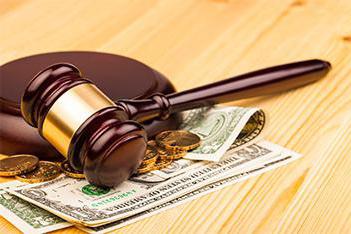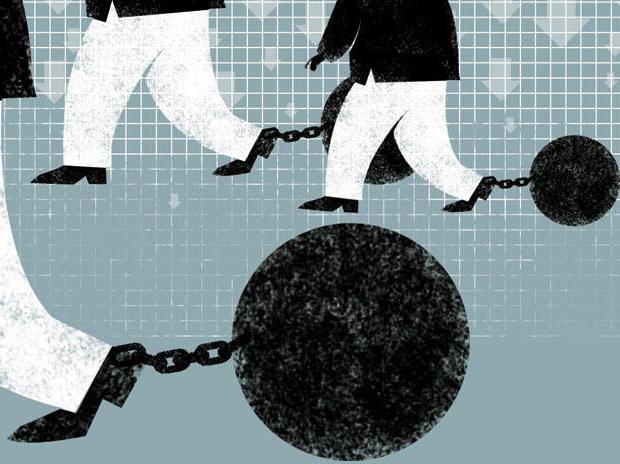Vicarious liability is the right to collect an uncollected or incompletely received debt from another subject of specific legal relations, in the event that the first debtor cannot independently make payments to the creditor.
In the context of an LLC, vicarious liability acts as an additional liability that passes to the partners if the defendant is unable to satisfy the stated claims from its own reserves.
Category Features:
- the size of the share contributed to the authorized capital of the LLC does not affect the degree of subsidiary liability; all co-founders bear equal liability for the organization’s debts;
- occurs when the LLC’s property cannot cover debt obligations and is mediated by seeking funds from the founders and other obligated persons;
- if one of the co-founders does not have the means to repay the debt on the principle of subsidiary liability, then the portion attributable to the specified person will be divided in equal proportions among the remaining responsible entities;
- To apply subsidiary liability, the guilt of the responsible persons must be proven;
- An indispensable condition for attracting subsidiary defendants is the initiation of bankruptcy proceedings.
Subsidiary liability in case of bankruptcy of a legal entity
The legislation provides for several organizational and legal types of enterprise. LLC is considered the most common today. This form is considered by many founders as the most suitable, since they believe that all risks are limited by the amount of the authorized capital. However, if a company is declared insolvent, this is not always the case. Each organization has entities that may be subject to subsidiary liability in the event of bankruptcy. They, in particular, are the sole executive structures of the company, who have the authority to give binding instructions. Such bodies belong to the category of “controlling”. There is a presumption of guilt for them. If there are several such entities, then subsidiary liability in the event of bankruptcy of a legal entity extends to them jointly and severally.
Director's liability in bankruptcy
The general director is the person who is entrusted by the founders of the company with responsibilities for managing the activities of the company, making operational and strategic decisions, and exercising control over the results of its functioning. A director can be either one of the founders of the company or a third party who does not have a share in its authorized capital.
The director can carry out any legally significant actions on behalf of the company, which means that he is responsible for the results of their execution on an equal basis with persons who have the status of founder. However, the director may be exempt from subsidiary liability if he is an employee and can prove during legal proceedings that his actions were the result of the execution of instructions given by a person with appropriate authority (i.e., the founder). Otherwise, he will have to pay off the company’s debts using his own funds.
***
So, the liability of a company participant is not limited to his share in the authorized capital. The legislator provides creditors with the opportunity to collect funds to pay off debts owed to them and from the personal funds of the founder or other manager of the company. The basis for bringing persons who controlled the actions of a bankrupt company to financial liability may be the lack of initiative to declare the enterprise bankrupt if it is unable to fulfill its debt obligations, or the performance (or, conversely, failure to perform) certain actions that entailed loss of solvency by the company.
general characteristics
Vicarious liability in bankruptcy means “additional”. It is assigned to certain entities if the company’s property is not enough to satisfy all claims. Vicarious liability in the event of bankruptcy of a debtor involves recovery in the form of personal material assets of the founders, managers, etc.
○ Advice from a lawyer:
✔ If the director of an organization, after bringing him to subsidiary liability, cannot pay his debts, will the guarantor pay the debt for him?
This doesn't always happen. Often, the guarantor will pay the debt for the manager based on the terms of the guarantee agreement. In addition, the guarantor can be obligated to pay debts if the director himself is declared bankrupt, and the enterprise’s creditors present their claims against the debtor as an individual.
Principles
When assessing risk, individual authorities need to take into account a number of nuances. Civil law establishes the basic principles of the activities of structures. They are, in particular, reasonableness and conscientiousness. The corresponding provisions are present in Article 53. In Art. 53.1 of the Code states that if dishonesty and unreasonableness in the implementation of duties and the exercise of rights by the executive body of the enterprise is proven, or it is established that its actions did not fit into the usual conditions of turnover or did not correspond to business risk, then it is subject to subsidiary liability in bankruptcy. Judicial practice on this matter is very ambiguous. The general rules of the Civil Code can play a significant role in the proceedings.
The essence of the situation
Any company can become insolvent. This is due to various circumstances. For example, such a situation may be caused by incorrect decisions of management, deliberate evasion of repayment of obligations, etc. The founders and management must understand that in such cases subsidiary liability may arise. In bankruptcy, it often happens that the company's assets are not enough. This is also due to various circumstances. However, they will not matter when satisfying creditors' claims.
Responsibility
Legally, the CDL may be awarded damages if the law has been violated. Is there a penalty for inaction if the debtor has not taken all measures during the paperwork process to appeal unsubstantiated claims? creditors. Opposition from managers plays an important role in bankruptcy proceedings, so they need to constantly be fully armed so as not to be held vicariously liable.
If the actions of the CDL were not productive enough and the claims of the creditors were not satisfied, due to the lack of finances necessary to pay the costs during the legal proceedings, or if the petition to recognize the debtor as an insolvent person was returned, then it is assumed that the manager will be held vicariously liable without bankruptcy.
Definition
Vicarious liability in bankruptcy is the possibility of collecting the outstanding amount from one of the additional entities if the main one is unable to satisfy the claims of creditors on its own. As is clear from the above, these include founders and managers. It is they who, first of all, after the direct debtor, are assigned additional responsibility.

When does subsidiary liability arise?
If a company that has debts to creditors does not have the necessary property to pay off, then subsidiary liability arises. The articles of the law state that liability in case of insolvency can be divided into several types. It occurs if:
- it is not possible to fully satisfy the claims of creditors (see Article 61.11 of the Insolvency Law);
- the bankruptcy petition was filed at the wrong time or was not filed at all (see Article 61.12 of the Insolvency Law);
- the law was violated (see Article 61.13);
- the debtor suffered losses provided for by corporate law (see Article 61.20).
Based on judicial practice, each individual case concerning bankruptcy is considered individually. To understand the legal intricacies, you need to consult a lawyer.
Regulatory regulation
Vicarious liability in the event of bankruptcy of an LLC in the Republic of Belarus, as in the Russian Federation, is regulated by the relevant law. In Russia, in particular, this is the Federal Law “On Insolvency”. It establishes the obligation to repay all debts of an enterprise declared insolvent. Often their amount significantly exceeds the volume of the company's assets. According to the norms of the Civil Code, which also regulate this area, the corresponding responsibility is assigned to the founders and managers. In addition to the Code, regulatory regulation is carried out by the Federal Laws “On JSC” and “On LLC”. They repeat the conditions provided for in the Insolvency Law.
Vicarious liability of the founder and manager of an LLC for debts in 2020
Or these entities had the right to appoint a manager of a legal entity.
- full comrades-participants of a friendship of faith (clause 2 of Article 82 of the Civil Code);
- owners of assets of state-owned companies if the volume of assets of the entities does not cover the debt to creditors (paragraph 3 of paragraph 6 of Article 113 of the Civil Code);
- owners of assets of subjects of other forms of ownership in the same case (clause 3 of Article 123.21 of the Civil Code);
- guarantors liable for obligations secured by their guarantee;
Have you decided to prepare and submit an application to the Arbitration Court about your insolvency? It is very important to analyze all transactions and agreements for the alienation of any assets before filing an application. After all, the manager has the right to challenge dubious transactions and redistribute property in the interests of bankruptcy creditors who are in the register. Get a consultation for free!
- his careless and unreasonable actions determined the impossibility of full repayment by the legal entity of its own debts (stat. 61.11 Federal Law No. 127);
In the absence of all the above criteria, it is unrealistic to attract the director to the CO.
If he has not done this, the initiative to file is transferred to the bankruptcy creditors.
The result of these actions should be the difficulty of carrying out the procedures provided for in bankruptcy.
- failure to submit reports during the year;
- absence of transactions on the bank account during the specified period.
- A list of additional acts of controlling persons that determined the impossibility of repaying all debts of a legal entity (for example, the absence or replacement of documentation, the mandatory availability and storage of which is regulated by law, failure to provide or distortion of information included in the Unified State Register of Legal Entities and Individual Entrepreneurs, etc. ).
- register another legal entity;
- buy a role share,
- head a business entity.
Range of subjects
Vicarious liability in bankruptcy may be assigned to:
- Founders - business participants.
- The directors of the company through whose fault a state of insolvency arose.
- Fiduciaries whose powers include managing shares of the enterprise.
- Other citizens who do not have a legal connection with the company, but actually exercised management for two years before the onset of insolvency.
As Article 2 of the Insolvency Law indicates, an individual will be recognized as involved in the conduct of the company’s affairs if:
- It gave instructions that must be followed.
- Determined the actions of the company through the beliefs, authority, and coercion of executive structures.
- Directly influenced the manager and other company participants who made management decisions.
How to avoid subsidiary liability
If the founders and managers of an LLC are accused of untimely initiation of bankruptcy, they can defend their case in court. The head of the organization is able to provide evidence that he lacks such powers, referring to Art. 227, 230 Federal Law No. 127.
Another reason for not filing a petition with the court to begin the bankruptcy process may be a shortage of funds from a legal entity, which are not enough to pay obligatory payments and legal costs.
Another basis for bringing officials to subsidiary liability will be their actions that contributed to the insolvency of the organization. When refuting the charges, defendants can defend their case by drawing the judge’s attention to the following circumstances:
- the incriminating materials contain insufficient or no evidence of the guilt of the company's managers;
- there is no cause-and-effect relationship between management’s behavior and the occurrence of bankruptcy;
- the conclusions regarding the mismanagement of the enterprise have no motive.
All objections to the charges raised by the owners and management of the enterprise must be considered by the judge separately for each case. After studying all the materials at the court hearing, decisions are made to hold officials vicariously liable or to absolve the defendant of guilt.
Conditions
Under what circumstances does subsidiary liability arise in bankruptcy? Judicial practice is based primarily on the provisions of the Federal Law “On Insolvency”. According to amendments adopted in 2009, in order to involve founders, managers and other controlling entities in the procedure, a number of conditions must be met. Vicarious liability in the event of bankruptcy of a municipal unitary enterprise or another, including a commercial enterprise, occurs:
- If there is a decision made by an arbitration authority that the enterprise has been declared insolvent.
- After determining the volume of claims presented by creditors.
- Upon completion of the formation of the bankruptcy estate and its implementation.

When participants bear subsidiary liability

Vicarious liability arises in the following cases:
- LLC bankruptcy:
- through the fault of persons authorized to give orders and influence the activities of the company (persons authorized to give orders that are binding are held liable);
- if the head of the organization fails to file a bankruptcy petition on time;
- in case of insufficient property of the debtor to fulfill financial obligations (persons exercising control over the activities of the debtor during the bankruptcy procedure are held liable);
- in case of distortion, incorrectness, absence of necessary information in the accounting documents and reports of the debtor regarding its obligations and the amount of property identified during the introduction of the monitoring procedure or the decision to declare the entity bankrupt (responsibility rests with the head of the debtor organization);
- Inflating the value of the debtor’s property and failure to make deposits (subject to the following conditions):
- the fact of shortage of the debtor's property was revealed;
- if payment for shares of the authorized capital was made in non-cash equivalent;
- the amount of liability is limited to the amount attributable to the difference in overvaluation of the cost from real indicators;
- the statute of limitations for bringing to liability for overvaluation is 3 years;
- Participants of the company and the independent appraiser who established the value will be held accountable;
- additional contributions that increased the authorized capital were not actually made during the three-year period preceding the date of the application for these contributions (members of the LLC will be held liable).
Subsidiary defendants may be:
- director, founders of an LLC or other person vested with managerial powers;
- persons controlling the debtor (including members of the liquidation commission);
- Chief Accountant;
- persons authorized to carry out transactions on behalf of the obligated entity, including those who made financial transactions to the detriment of the latter’s economic activities;
- persons who own 50% of shares or a share of the authorized capital of an enterprise;
Initiators
Creditors of a legal entity can go to court with demands to hold them accountable. Often the initiator is the arbitration manager. In addition, subsidiary liability in bankruptcy may be imposed at the request of the insolvent entity itself. If he is sure that he will not be able to pay off his obligations within the established period, then it is more profitable to send a corresponding application. In this case, he will receive significant advantages. For example, he has the opportunity to control the entire insolvency procedure.
Grounds for the emergence of subsidiary liability
Federal Law No. 127 defines specific grounds for imposing subsidiary liability on a person:
- Failure to fulfill the obligation to file an application to declare the debtor bankrupt (clause 2 of article 10 of Federal Law No. 127). At the same time, paragraph 2 of Art. 9 Federal Law No. 127 determines the period during which the authorized person is obliged to submit such an application: this must be done within a month from the date of occurrence of events that could cause bankruptcy of the enterprise.
- Actions (or inaction) that resulted in the bankruptcy of the organization (clause 4 of article 10 of Federal Law No. 127).
Vicarious liability arises when the following conditions are simultaneously met:
- the organization was declared bankrupt in accordance with the procedure established by law;
- the property owned by the enterprise is not enough to satisfy all the requirements presented to it;
- the person held accountable had rights sufficient to influence the activities of the company;
- based on the results of the analysis and assessment of financial and accounting documents, a cause-and-effect relationship was established between the actions of the person held accountable and the onset of bankruptcy of the organization, or the debtor’s representative did not apply to the court to declare him bankrupt on his own.
Bringing to subsidiary liability in bankruptcy becomes possible on the basis of an application that can be submitted to the arbitration court by the bankruptcy trustee or, according to Art. 142 Federal Law No. 127, creditors of the enterprise whose claims were not satisfied even after the sale of the bankruptcy estate.
Competition manager
He also has the right to initiate bankruptcy proceedings and demand that controlling persons be brought to subsidiary liability. But even in this case, the legislation establishes a number of conditions:
- Requirements for the company must exceed 100 thousand rubles.
- More than three months have passed since the debt began.
- The amount of outstanding obligations was confirmed by the decision of the arbitration authority, which came into force.
It should be said that only the amount of the debt is taken into account without penalties, losses, and interest for late payments. If the amount of liabilities is less than 100 thousand rubles, then creditors can write a collective statement.

Arbitrage practice
Judicial practice on disputes that mediate the bringing to subsidiary liability indicates that measures for the bankruptcy of the debtor and the requirement to satisfy debt obligations at the expense of the funds of persons liable to subsidiary liability do not always justify the hopes of the creditor.
These circumstances are based on the fact that the creditor does not have an evidence base of cause-and-effect relationships between the actions of the management team of the debtor company and the consequences of their decisions, which would indicate incorrect disposal of the assets of the LLC.
The creditor does not have access to information about the debtor’s financial transactions, which become known only to the bankruptcy manager during the bankruptcy procedure. It is he who is competent to give a legal assessment of the actions of the debtor and the justification of the risks he has incurred.
The practice is that, in some cases, the arbitration manager is inclined to consider the debtor’s actions appropriate. Then the subsidiary liability of the founders and participants of the LLC is completely excluded, and the claims will be satisfied to the extent that can be covered by the property on the organization’s balance sheet.
Federal Tax Service
The tax office also has the right to initiate insolvency proceedings. Vicarious liability in the event of bankruptcy of a bank or other commercial structure, at the request of the Federal Tax Service, may be imposed:
- For financial obligations, if they have not been repaid since the date of entry into force of the relevant arbitration decision.
- For taxes and fees, if more than a month has passed since the tax authorities made their decision.
It is worth saying that in the latter case, not only subsidiary liability arises in bankruptcy. What fine will be imposed on the company is decided by the Federal Tax Service. The basic rules for imposing penalties are established in the Tax Code and the Code of Administrative Offences.
Subsidiary liability in case of bankruptcy of an individual
Since 2020, the procedure for recognizing the insolvency of citizens has been applied. Innovations make it possible to recover their personal property from founders, managers and other controlling entities if it is impossible to do this when brought to subsidiary liability. How it works? In such cases, the courts use the following formulation: the obligations that a citizen has incurred in connection with the holding of an insolvent enterprise to subsidiary liability by a creditor act as the basis for starting bankruptcy proceedings against him. Controlling entities should be wary of this if the size of the demands presented to them is more than 500 thousand rubles. At the same time, citizens are not able to repay them within 3 months. from the date of entry into force of the court decision.
Vicarious liability - what is it?
Many entrepreneurs are confident that only the individual entrepreneur is responsible for the debts of the enterprise with his own property, and the founders of the LLC, in the event of unfavorable business development, will only lose the authorized capital, the size of which in many (even large) companies does not exceed 10 thousand rubles. In fact, the personal property of the founders of an LLC is not inviolable: bringing persons with this status to subsidiary liability has long become a reality - to be convinced of this, it is enough to familiarize yourself with the existing judicial practice.
Vicarious liability in bankruptcy means the imposition of the obligation to fulfill the debt obligations of an LLC on its founders, general director, chief accountant or other persons who made strategically important decisions that ultimately influenced the activities of the company and resulted in its debt burden, to get rid of which she cannot do on her own. The person controlling the debtor may also be held liable in accordance with the provisions of Art. 2 Federal Law No. 127, he is a person who, for no more than 3 years before the commencement of arbitration proceedings against the debtor, exercised actual management of the company, setting certain goals and objectives for its employees, as well as determining the procedure for achieving them.
Negative consequences
Vicarious liability in the event of bankruptcy of an individual carries a number of risks for the citizen. First of all, creditors have the opportunity to challenge any transactions concluded by controlling entities. These include marriage contracts and property gift agreements. According to the general rules, after completing settlements with creditors, a person (legal or individual) declared bankrupt is released from subsequent repayment of obligations. However, there are several exceptions to this rule. The main thing concerns the requirements to bring a citizen to subsidiary liability. In other words, claims after the entity has been declared insolvent will remain valid regardless of exactly when they were filed. Creditors can also make claims after the proceedings are completed. As a result, the controlling persons of a bankrupt enterprise who are held accountable will not be able to get rid of the obligations imposed on them. Even the procedure for recognizing personal insolvency will not help with this. The debt that appears within the framework of subsidiary liability will remain until full repayment.

Application for bringing to subsidiary liability
Application for bringing the debtor's representative to subsidiary liability, in accordance with paragraph 5 of Art. 10 Federal Law No. 127, may be accepted by the arbitration court:
- during bankruptcy proceedings (provided that the application is submitted by the bankruptcy trustee, a representative of a person working for the debtor, an employee or former employee, as well as an authorized body);
- within 3 years after the completion of bankruptcy proceedings;
- after the court rejects an application to declare the debtor bankrupt in the event that the funds available to him are not sufficient even to pay the legal costs arising during the conduct of legal proceedings.
In addition, an application to hold a person vicariously liable may be filed with the arbitration court within 1 year from the date the applicant receives information about the existence of grounds for imposing such liability on him, but no later than 3 years after the debtor was declared bankrupt judicially.
Legal requirements
The director and founders of the enterprise may be held liable in accordance with the provisions of Article 401 of the Civil Code. To do this you need to have:
- Unlawful violation of duties officially assigned to a citizen.
- Losses incurred by the company as a result of the illegal actions of the entity.
- Connections between a person's behavior and company losses.
- Proven guilt of a citizen.
Prosecution is carried out only if all requirements are met in total. Accordingly, each circumstance must have documentary evidence. A statement is drawn up regarding the controlling entities. It, in fact, sets out the requirement to bring them to justice. Arguments should be given with reference to legal norms. In addition, it is necessary to indicate the financial verification of the debtor’s work. All creditor claims must also be documented. In addition to the application, an extract from the account is attached, as well as a copy of the request for the transfer of accounting documents. All these materials are carefully studied by the court.
Reasons for making claims
Controlling persons are held accountable in the following cases:
- Causing damage to creditors as a result of certain transactions being carried out by obligated entities.
- The accounting documentation lacks the necessary data or there is no reporting at all.
- Misrepresentation of information in financial papers led to losses.

Of course, these are not all possible reasons why entities bear subsidiary liability. The situations can be very different. However, in any case, the requirements established by law must be observed. Otherwise, any imposition of additional obligations is unlawful.
Exceptions to the rules
In some cases, controlling persons cannot be held vicariously liable. In particular, relevant demands cannot be made if it is established that there was no guilt in their actions. It is not allowed to hold citizens liable after the liquidation of a legal entity if bankruptcy proceedings have not been initiated against the company. The corresponding provision is present in Article 419 of the Civil Code. A person cannot be held liable if there is no causal connection between his actions and the damage incurred. It proves that it was the behavior of a particular entity that led to losses, due to which the enterprise became insolvent. To establish this connection, it is necessary to have documentary evidence of all actions of the person held accountable. A mandatory condition is the procedure for recognizing the insolvency of a company. If it has not been started, vicarious liability cannot apply to anyone. Moreover, the legislation provides certain benefits for founders and management. If they independently submitted an application to begin the procedure, then they cannot be held vicariously liable. This is the only way to avoid new obligations. It often seems to controlling subjects that making such a decision is difficult and even impossible, but there is no other way. Otherwise, they may become eternal debtors.
Responsibility of the founder in bankruptcy
It is obvious that a person who is one of the founders or is the sole founder of a company has rights that allow it to regulate the activities of the organization and direct it in a certain direction. That is why bringing him to subsidiary liability is becoming a very common phenomenon in arbitration judicial practice.
The founder's liability arises if he:
- made transactions to the detriment of the activities of the enterprise, while taking care of his own interests;
- hid information about the details of the transaction from other participants in the company, knowing that the conclusion of the agreement would entail adverse consequences for the company;
- did not properly check the counterparties and contractors with whom transactions were concluded (for example, did not assess the integrity of the business partner, did not check whether the contractor had a license when the legislator obligated him to have such a document, etc.);
- falsified or concealed company documents, etc.
The founder (or one of the founders) of the company is not obliged to carry out anyone’s instructions, therefore it will not be possible to refer to the fact that in the course of carrying out the above actions he carried out someone else’s instructions. If the founder does not prove that the reason for the execution of actions that led to the bankruptcy of the company was his lack of qualifications, he will have to repay the debts incurred to creditors at the expense of his own funds not involved in running the business. Either one of the founders of the LLC or several of them can be held liable - in this case they will be liable to the creditors jointly, i.e. jointly and severally.







